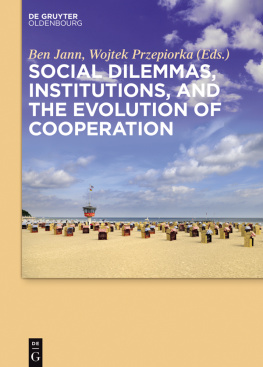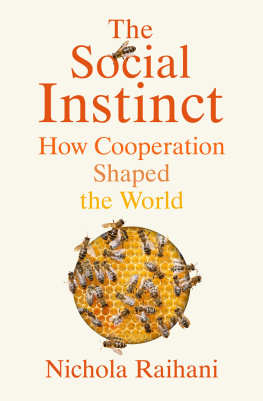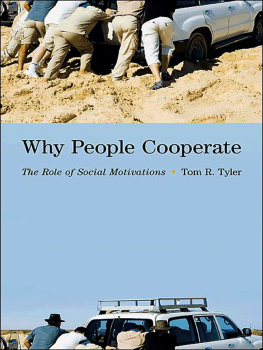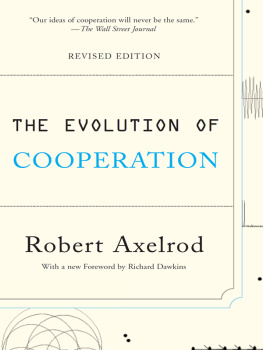Contents
Guide

Ben Jann, Wojtek Przepiorka (Eds.)
Social Dilemmas, Institutions, and the Evolution of Cooperation
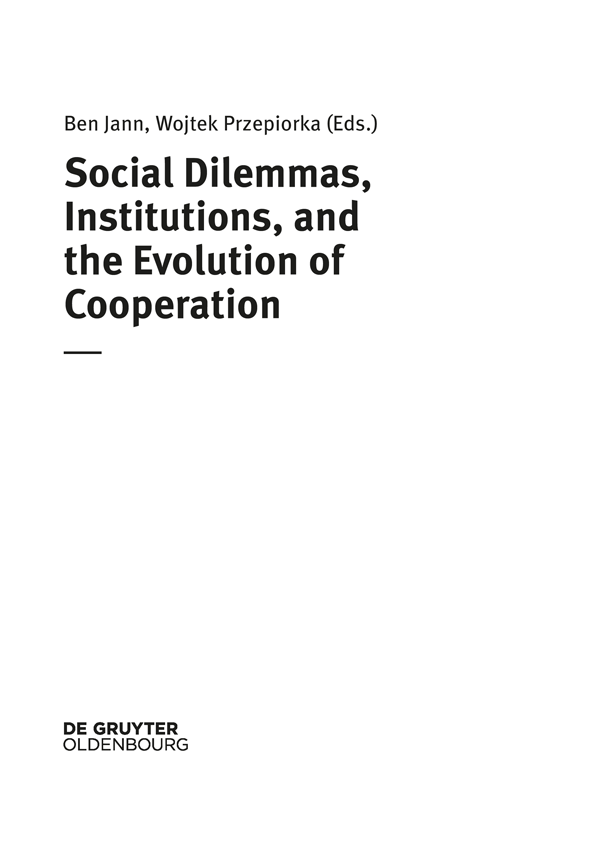
ISBN 978-3-11-047195-3
e-ISBN (PDF) 978-3-11-047297-4
e-ISBN (EPUB) 978-3-11-047069-7
Library of Congress Cataloging-in-Publication Data
A CIP catalog record for this book has been applied for at the Library of Congress.
Bibliographic information published by the Deutsche Nationalbibliothek
The Deutsche Nationalbibliothek lists this publication in the Deutsche Nationalbibliografie; detailed bibliographic data are available on the Internet at http://dnb.dnb.de.
2017 Walter de Gruyter GmbH, Berlin/Boston
Cover image: Zoonar RF/Zoonar/Thinkstock
www.degruyter.com

For Andreas, our teacher, colleague, and friend.
Preface
The starting point of this book project goes back several years, when one of us discussed the idea of compiling a Festschrift for Andreas Diekmann with the late Norman Braun of LMU Munich. The idea went into hibernation for some time, popping up now and again but mostly remaining in a deep sleep. In the spring of 2015, at a meeting of the Model Building and Simulation section of the German Sociological Association in Leipzig, a gentle nudge by Werner Raub and Thomas Voss infused the idea with a breath of life. Since neither of us is fond of the somewhat outdated Festschrift format, we decided to design a book with a focus we consider important, and about which the research community surrounding Andreas has much to say. The books topic lies at the core of sociological interest, as it deals with the most fundamental aspects of human sociality. Our choice of topic was also a natural one, given Andreas many important contributions to it. However, it is important to mention that Andreas has made many significant contributions to various other fields of sociological research. We therefore hope that our colleagues who were not asked or unable to contribute to this volume due to a lack of thematic fit will nevertheless join in with this books merry celebration of Andreas great achievements.
On a more serious note, to ensure high scientific quality, all chapters in this volume have been peer reviewed (single-blind), typically receiving two reviews per chapter. Most contributors served as reviewers for one of the other chapters, and we would like to thank them as well as Vincenz Frey, Diego Gambetta, and Lukas Norbutas, who acted as external reviewers, for their valuable services. Their reviews resulted in significant improvements to the articles included in the book. We also thank the authors for their patience and willingness to take the extra effort of detailed revisions of their contributions. All chapters were edited by a professional proofreading service; we would like to thank James Disley and his team for their prompt and high-quality work. Furthermore, we thank Stefan Ilic and Tina Laubscher for their help with the technical processing and preparation of the chapters for the publisher.
Most importantly, however, we would like to thank Andreas for being our teacher, mentor and supporter, but also our sharpest critic, friend, and inspiration.
March 2017
Ben Jann and Wojtek Przepiorka

Part I: Foundations
Ben Jann and Wojtek Przepiorka
Introduction
The question of how cooperation and social order can evolve from a Hobbesian state of nature of a war of all against all (Hobbes [1668] 1982) has always been at the core of social scientific inquiry (e.g., Axelrod 1984; Bowles and Gintis 2011; Durkheim [1893] 1997; Ellickson 1991; Ostrom 1990; Sennett 2012). Various approaches exist for addressing this question, but the theoretical lens through which we view the phenomena presented in this book is methodological individualism (Weber [1922] 2013; Coleman 1990). Methodological individualism reminds us that cooperation and social order are macro-sociological phenomena that can be, and need to be, explained as a result of the goal-oriented behaviors of actors. A key insight from this point of view is that social dilemmas constitute a pivotal analytical paradigm that can be used by social scientists to investigate the origins of conflict, competition, and cooperation among humans. Social dilemmas are therefore well suited as the micro-foundational building blocks for a stringent theoretical explanation of cooperation and social order (Kollock 1998).
Social dilemmas are situations of strategic interdependence in which the decisions of individually rational actors lead to an inferior outcome for all or some parties than the decisions of collectively rational actors. Collective rationality means that actors, had they an opportunity to communicate and agree on a binding contract, should agree on a combination of actions leading to a welfare-enhancing outcome (Diekmann and Przepiorka 2016:1311). Social dilemmas, therefore, are at the core of the problem of social cooperation. Their analysis identifies when and why humans may struggle to achieve a collectively rational solution, what societal benefits they forgo in their struggle, and what mechanisms and measures may help overcome the struggle.
Social dilemmas are usually described in game theoretic terms. Apart from the well-known Prisoners Dilemma, there are many examples of social dilemmas (McAdams 2009; Raub, Buskens, and Corten 2015). Social dilemmas are mostly studied in small groups, such as dyadic interactions with trust at stake, or voluntary contribution situations in which a public good is produced only if enough group members contribute their resources. However, social dilemmas also occur on a large scale. The common pool resource dilemma is often used to describe the clash between individual and collective rationality in environmental issues such as fishery, land use, and traffic (Ostrom 1990). Coordination problems, in which actors must agree on one of many welfare-enhancing outcomes, also fall under the definition of social dilemmas.
The gap between the individual and collective rationality inherent in social dilemmas (Rapoport 1974) creates a demand for the regulation of actors behavior (Coleman 1990; Voss 2001). Such regulations can be formal and manifest themselves in terms of legal codes and other institutions providing selective incentives. Regulations can also, however, be informal, and emerge as social norms that prescribe or proscribe certain behavior that is enforced by positive and negative peer-sanctions (Hechter and Opp 2001).
In general, whether formal or informal, such regulations can be understood as institutions , defined as humanly devised constraints that shape human interaction (North 1990:3). A specific type is social norms, defined as rules guiding social behavior, the deviation from (or adherence to) which is negatively (or positively) sanctioned (e.g., Bicchieri 2006). Both social norms and other institutions are subject to change, due to technological innovations, policies and external shocks such as economic, political and environmental crises. These changes, in turn, affect the ways in which we interact on a small and on a large scale, and how we cooperate. Thus, while the notion of social dilemmas makes problems of cooperation comprehensible, the analysis of institutions is key to understanding the evolution of cooperation .

